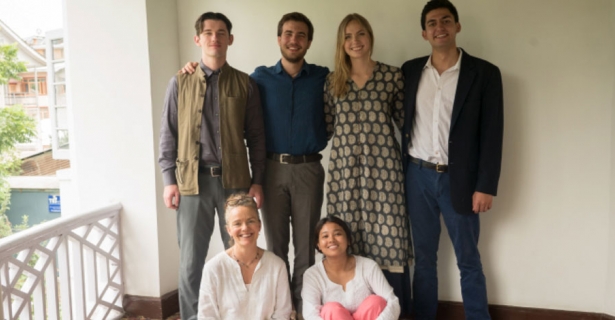Photo (left to right) top row: Tufts' Liam Flaherty, Ogul Girgin, Nora Nord, and Seth Gray. Bottom row: Healing Kashmir's Justine Hardy and Ritu Konsam
After the death of Burhan Wani on July 8th, parts of Kashmir and most of downtown Srinagar have been under curfew. Thousands of Kashmiris joined in the mourning of this 22 year-old militant who was killed by Indian forces shortly after the Eid holiday and only a couple days before Kashmir Martyrs Day. Wani’s face and social media presence represented the new wave of militancy in Kashmir, and the retaliation for his death was largely that of a frustrated youth born into a society with deep-rooted resentments.
The graffiti in Srinagar reflects these frustrations. “Intifada,” “Go India, Go,” “I am Burhan,” “Stop Senseless Killings,” and “AK-47” are scrawled onto walls and metal rolling gates outside of closed storefronts. The youth, who were born into the conflict and have seen it diminish throughout their lives, are clawing for change.
Kashmir’s youth are put in a perplexing situation, where one of the highest levels of attainment in their society is a government job, while, at the same time, they hate that very government due to political circumstances.
From a very young age they are exposed to unhealthy stress and trauma that makes it extremely difficult for many of them to cope with stress in their adult lives. The stress that every teenager deals with, exam stress, relationship problems, and the question of one’s purpose in life become exacerbated within Kashmir. Worrying about exam scores, for example, manifests into the inability to concentrate, the lack of interest in studies and daily activities, forgetfulness, headaches, heart palpitations, sleeplessness, fatigue, etc.
On top of this, there is a restless understanding for many Kashmiris that, as soon as they fail one of their exams, they will no longer be afforded the opportunity to go to school and be forced to help their family make ends meet. To quote a surrendered militant, “A failure in foreign helps a youth to learn, but here a failure becomes end… Hundreds of cases have been seen, [where] students helplessly drop [out of] school to fulfill the needs of family.” This knowledge heightens their stress and strengthens the negative thinking patterns that come out of it.
There is also this overwhelming knowledge that a lot of highly educated graduates from Kashmir’s top universities are facing unemployment. The conflict environment has gotten rid of almost all outside investment. Entrepreneurship is rising in the valley, but very slowly. Often times government jobs will favor less qualified candidates with more connections within the agency than more qualified outsiders. The stress and anxiety that students are going through appear pointless.
This creates a deep and overwhelming feeling of hopelessness within the youth population, which is internalized as a feeling of worthlessness. Frustration with their personal position, however, is channeled into frustration with their broader political position. It is so much easier to blame someone else for your shortcomings, especially when that “other” is woven into popular discourse. Kashmiris view themselves as victims of India, and because of that, they believe that productive change necessitates secession.
We several interns spent the week following the curfew working out of our guest houses in Rajbagh, one of the safest regions in Srinagar. It was a simple minute walk from Mahatta Home Stay, where we were staying, to the Green Acre, where Justine and Rakesh were staying. The project was to develop an argument for implementing a mental health program into high schools, so as to take preventative measures to combat the mental health epidemic in Kashmir (according to MSF, 41% of adult Kashmiris are suffering from depression, 26% are suffering from anxiety, and 19% are suffering from PTSD). The idea of the module is to teach young Kashmiris, age 14 to 18, about how the fears and stresses impact their ability to perform and make logical decisions as well as give them productive methods to combat this and lead a healthy lifestyle; to teach them to be autonomous.
When one views themselves as a victim, it's easy to blame the thing that victimizes you for all your difficulties. And when that’s the case, the only way to get rid of one’s difficulties is to get rid of the thing that victimizes you. It’s a lot harder to understand one’s self than to blame one’s enemy.

